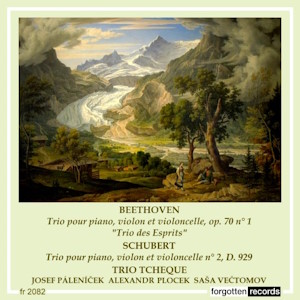
Ludwig van Beethoven (1770-1827)
Trio for Piano, Violin and Cello, Op. 70 No.1 Ghost
Franz Schubert (1797-1828)
Piano Trio No.2 in E-flat, Op.100, D. 929
Trio tchèque
rec. live radio recordings, 27 May 1962, Mai Musical de Versailles (Beethoven); 24 May 1962, Paris (Schubert)
Forgotten Records FR2082 [61]
As there are no notes accompanying this release I had to do a spot of googling for some information on the Trio tchèque. Josef Páleníček, the pianist in these recordings founded the Smetana Trio in 1935 with violinist Otta Silhavy and cellist Frantisek Smetana. Ten years later when the trio returned to Czechoslovakia they adopted the name Trio tchèque or Czech Trio. Over the years there were several changes of personnel among the violinists and cellists, with pianist Josef Páleníček remaining the only constant. The line-up for these two live radio recordings, each dating May 1962, is Josef Páleníček (piano), Alexandr Plocek (violin) and Saša Večtomov (cello).
Beethoven’s Ghost Trio is undoubtedly one of his greatest chamber works. The title of the work wasn’t the composer’s own but Czerny’s, who declared that the central movement reminded him of the ghost of Hamlet’s father. The opening movement of this live performance crackles with energy and is nervously charged throughout. The players give of their all, rendering a reading of vitality, enthusiasm and brilliance. The eerie opening of the Largo middle movement which gives the Trio its nickname is magically conjured, with the Trio tchèque retaining the music’s mystique, whilst fully conveying its spectral menace. The finale conveys all the sentiments of whimsy and caprice.
Schubert’s Piano Trio No. 2 in E flat overflows with endearing melodies, colourful harmonies and a variety of rich textures. In contrast to the earlier Piano Trio, Op. 99, where a carefree spirit pervades, Op. 100 is more dramatically etched. The performance fully gets to grips with the constant mood changes and vividly points up the moments of darkness. I must single out the cellist Saša Večtomov, who is deserving of a special mention for his solo contribution to the second movement. His opening melody, set against the piano’s rhythmically buoyant accompaniment, is enhanced by the richness and beauty of his tone. I haven’t heard it done any better. The finale has a real life-affirming spring in its step.
The Trio tchèque’s commercial discography is comparatively meagre. All I could find are some Beethoven Trio inscriptions, an LP of Roussel and Ravel and a studio recording of the Schubert Trio featured here. So, kudos to Forgotten Records for their splendid restorations of these two valuable live airings in very agreeable sound. Audience presence and applause add greatly to the frisson of the two live events.
Stephen Greenbank
| Availability |  |


















